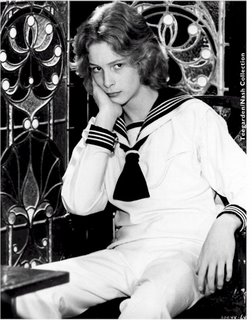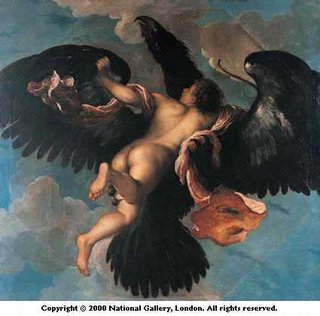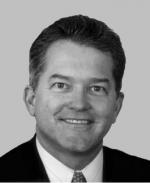Some SEX-EC
Recently I attended a one-man stage adaptation of Thomas Mann’s Death in Venice. As theater it was a surprising success, but only because, like the novella itself, it was presented as a toss-off—eighty minutes, no intermission—not a complete evening of dramatic entertainment.
I saw it maybe three weeks before the Congressman-Foley-chasing-after-teenage-pages-scandal broke. Too bad. I’d like to see the actor going on about Tadzio’s godlike beauty, against the background of Foley’s take-your-boxers-off IMs. Could he keep a straight face, so to speak?

When I first read the book and then saw the movie, I was a coming-out-gay leftist English lit major. I saw the moral of the story as simple, and comic: Fuck when you’re young—don’t become a pathetic old man following young boys through the streets.
Now, after thirty years of not thinking much about it, I have to agree with my earlier assessment It’s a simple cautionary tale regarding age-appropriateness. Aschenbach’s predicament in Venice balances the inappropriate choices he made in childhood.
Rather than pursue pleasure in play and companionship in his youth, activities for which he felt inadequate, Aschenbach became a loner and grinder, achieving academic excellence not though brilliance but by dull lead-assedness. His literary achievement, Mann tells us, was substantial but mediocre. The only thing notable in his style was impeccableness, as opposed to, say, verve.
So, in his sixties, when vague impulses draw him to a vacation alone in Venice, he sees and develops a crush on a fourteen year old boy. The overwhelming effect on Aschenbach makes him think that there is something very special about the boy, Tadzio. Aschenbach gushes, mentally, just like an adolescent girl with her first major crush, on “the most beautiful boy in the world.” Tadzio “rises godlike” from the waves of the Adriatic.
There is nothing wrong about this experience and response, we’ve all gone through it, but it’s supposed to happen around age 13 or 14 or 15, not 62. By the time a man reaches his sixties, he should know that the response, “that’s the most beautiful (boy, girl, man, woman) in the world,” is common and fleeting.
The climax of the story comes when Aschenbach utters the words, regarding but not to Tadzio, “I love you.” And, Aschenbach knows, the words are completely appropriate, except they’re uttered fifty or so years too late.
Aschenbach dies, never having touched or even spoken to Tadzio. There is a kind of perfection in this, that could be called tragic. It’s like the lovers on Keat’s Grecian Urn who will always love but never kiss, and never, presumably, smell each other’s farts.
The inability or failure to form a relationship with a perfectly beautiful person can be thought tragic. But consider the disappointment consequent to actually forming such a relationship. I think of the serious young doctor marrying the mayor’s daughter, “a perfection of blondness,” in Middlemarch.
The young doctor found that sexual possession of a beautiful object was entirely possible, but that while being perhaps a necessary condition for happiness, it was certainly not sufficient.
The human species is so successful due at least in part to it’s extraordinary sex drive. A human male, when it comes right down to it, will fuck almost anything. Human females love their offspring beyond all else.
Human sex drive is so strong it crushes us. Aschenbach thought he could avoid it entirely. But Eros’ due could not be denied. Aschenbach paid his debt in Venice.
BTW: In the stage presentation, the actor would shift into the voices of those with whom Aschenbach interacted. I realized that throughout the story Aschenbach talks only with members of the serving classes or occupations—gondoliers, hotel managers, barbers, travel agents, etc. He never speaks with a peer. And he never speaks, or is directly acknowledged by Tadzio, except by glances, never, say, a head nod. This seems odd to me.
The story makes more sense if we assume that Aschenbach is felled by a stroke or something, back in Munich when he encounters the red-haired man with the rucksack, from which he never regains consciousness. The trip to Venice is Aschenbach’s deathbed dream.
TRADE IN D.C.
In his first throes of love, Aschenbach tries to think what kind of relationship he could possibly form with Tadzio, and he considers two paradigms from Greece, Zeus’ “rape” of Ganymede, and Socrates’ relationship with Phaido.

At one point Aschenbach approaches Tadzio from behind and is about to touch his shoulder and speak to him for the first time but Aschenbach gets heart-flutteringly weak in the knees and pulls back. He is not Zeus. He is not Socrates. Why would Tadzio want to interact with Aschenbach?
Tadzio, as we see him in the novella, has no male-adult contact. The father is absent. Tadzio would probably enjoy some supportive, fatherly attention from a kindly grown-up man, but Aschenbach, stupefied by physical attraction, is much needier than Tadzio. Nope, it just can’t work.
What we see in the Mark Foley hit-on-pages scandal is an alternative to true love called “trade.” This was a pre-Stonewall gay term of art I heard when I was coming out. It’s was used to describe a class of potential sex partners, who were “not gay” but were more than willing to engage in gay sex in exchange for some non-sexual valuable consideration. I heard terms like young trade, butch trade, rough trade.
Foley, apparently, was looking for male pages who wanted help along their career paths. Association with a sitting congressman could be extremely helpful for a young person with certain ambitions. Some pages could experience revulsion at Foley’s first innuendos. At the other end, some pages might already have a crush on Rep Foley. In the middle we might find pages who would put up with a certain amount of sex-talk, or even sex acts, in return for the congressman’s attention. That’s trade.
Foley’s activity is called “sexual harassment on the job.” It’s against the law and it’s against the golden rule, regardless of the ages of the people involved.

The most pathetic line in the revealed communications is Foley asking a page, “do I turn you on?” And the page replies, “a little.” Hey, Mark, if you have to ask, the answer is “no.” Foley has been mocked by comparison to Austin Powers sticking out his plaid-polyester-clad butt to his lovely costar and asking her if that turns her on.
Needless to say, this is not a question Zeus would ever pose to Ganymede, nor Socrates to Phaido.
2 comments:
Good essay. Usually the story is interpreted with an Aschenbachian heavy hand as an Apollonian vs. Dionysian struggle which has always struck me as absurd. I much prefer your stated moral ("fuck like a young person while you're still young").
Thanks, Mike. I think we tend to forget that Aschenbach is presented, by Mann, as a pompous mediocrity.
At the beginning of Magic Mountain, Mann goes to considerable lengths to let us know that he as chosen Hans Castorp as the hero because of his consistent mediocrity
Post a Comment